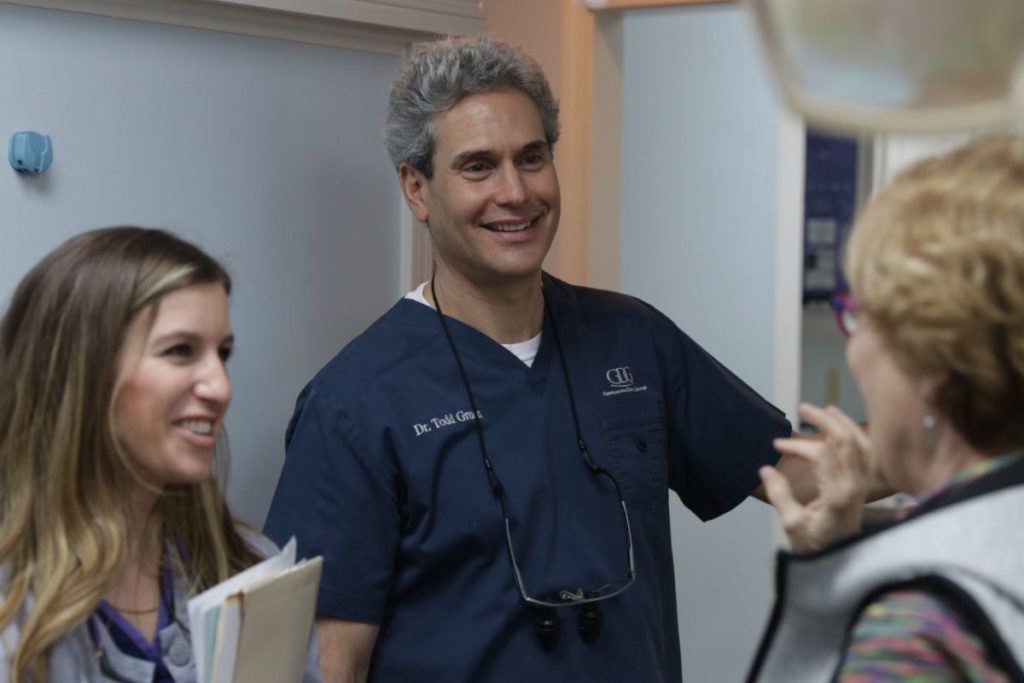If you’ve heard it once, you’ve heard it a thousand times. Brushing and flossing twice a day every day is the best way to fight off plaque and debris that cause oral health issues like gum disease and cavities. But, if we’re being realistic, we don’t always do what we should when life gets busy. You’re not alone if you sometimes forget to floss or slip into bed before brushing your teeth. Surveys conducted by the American Dental Association have shown that less than fifty percent of adults in the U.S. floss daily.
It goes to show that cavities aren’t just for kids. Good oral health is important regardless of how old you are. As people age, their risk for an oral infection continues to increase. The older teeth get, the more the protective enamel wears away, and the easier it gets for cavities to develop. At Germantown Dental Group, we believe that our patient’s oral hygiene at home is vitally important in conjunction with their recommended teeth cleaning at our local office at least twice a year.
Cavities happen to us all. In fact, about 92% of adults have had cavities filled, while close to 26% of adults have untreated cavities. Let’s go over the basics of this common dental issue and how to know if you have a cavity.
What is a cavity?
Basically, a cavity is a hole in your tooth. The most common place for cavities to develop is between your teeth, which is also the exact area you clean when flossing. Cavities form when bacteria inside the mouth produce acids that erode the tooth’s hard enamel surface. Over time and without treatment, cavities can extend further into the softer layers of the tooth, causing pain, swelling around the affected area, an infection, or abscess, in the tooth and gums, and even loss of part or all of the tooth. Some patients suffering from untreated cavities experience problems eating, leading to malnutrition and weight loss.
In extreme cases, an oral infection can spread to the bloodstream. This infection – septicemia – can be potentially life-threatening without prompt and aggressive antibiotic treatment.
Risk Factors
Anyone who has teeth is at risk for tooth decay and cavities, but there may be some factors that may increase the risk of cavities, such as:
- Incorrect or irregular brushing or flossing
- Not visiting the dentist regularly for checkups and professional cleanings
- Frequently snacking on high sugar foods or sipping on high sugar beverages
- Eating foods that cling to the teeth like gummy snacks and hard candies
- Not having enough fluoride, you need more than is possibly available in your water
- Medication that causes a dry mouth, since saliva helps neutralize and wash away harmful acids
Children have an increased risk of cavities due to their inability to brush their teeth efficiently on their own, combined with their propensity to consume more sugary foods. In comparison, factors that increase an adult’s risk for tooth decay and cavities include having existing dental fillings that may crack or receding gums, exposing the tooth root to plaque buildup, and eventually decay.
Some people have a more challenging time maintaining their oral hygiene and accessing professional care. The elderly population, some racial/ethnic and socioeconomic groups, and children from low-income families are among those who most often do not have access to appropriate dental care and have an increased risk of tooth decay and cavities. Other people with chronic diseases like diabetes, arthritis, or heart disease are also at higher risk for oral health issues.

How do I know if I have a cavity?
The signs and symptoms of tooth decay depend on factors like the location and extent of the pain and the number of teeth affected. Minor surface cavities may not cause any symptoms to begin with, but as the cavity progresses, you may experience the following:
- White spots on the surface of the tooth indicate early tooth decay
- Brown or black spots on the surface of the tooth suggest developing tooth decay
- Visible holes or dents in the tooth enamel
- Sensitivity or toothache in a pronounced area of a tooth
- Generalized toothache or jaw pain
- Pain when eating or drinking, especially hot, cold, sugary, or sour items
- Pain when biting down or chewing food
Not all toothaches are created or felt equally. If you are concerned you may have a cavity, get in touch with our friendly team to schedule an exam with Dr. Gruen or Dr. Whittemore. They will look for signs of tooth decay during an oral exam and use high-quality x-ray images to see between teeth and behind any existing fillings.
Treating a Cavity
Our expert dentists and their caring team use modern techniques and advanced technology to make your dental experience painless, efficient, and affordable. Your cavities and anxieties don’t stand a chance from our Picasso Diode dental laser that allows us to treat gum disease and many other conditions. Laser dentistry is virtually painless and can reduce the risk of bleeding, swelling, and infection.
Most cavities will only require a thorough cleaning of the space, removing decaying tooth structure, and filling in with a tooth-colored composite material. For tooth decay that is deeper or placed in a spot that would be difficult to fill, our dentists may utilize a dental crown. The cavity is still filled with packing material, but the whole tooth is covered with a tooth-colored porcelain crown.
If the decay reaches the root or pulp of the tooth to the point that it can not be repaired with just a filling or crown, you may need a root canal which consists of removing the dead or damaged nerve, blood vessels, and tissue along with the decayed portions of the tooth. This root space will be filled with a sealing material and may sometimes require a crown.

Prevent a cavity in your teeth with Germantown Dental Group
The best way to fight a cavity is to prevent it from forming in the first place. To do this, we recommend using an electric or soft toothbrush to brush your teeth with fluoride toothpaste twice a day. This combination is one of the most effective ways to clean harmful sugar and bacteria off your teeth. You will also benefit from flossing daily to get food particles and bacteria out of hard-to-reach places. Finish with an antibacterial mouthwash to help kill any remaining germs, and cavities will be the last of your worries.
Our dentists work with patients of various ages and know how to help children feel comfortable during dental visits. We recommend teeth cleanings start from a young age to instill good dental health habits as early as possible. We invite Memphis and Germantown patients of all ages to experience excellent dental care in a professional and friendly atmosphere. Get in touch to schedule your dental cleaning appointment today!
 Schedule Now
901-754-0540
Schedule Now
901-754-0540
